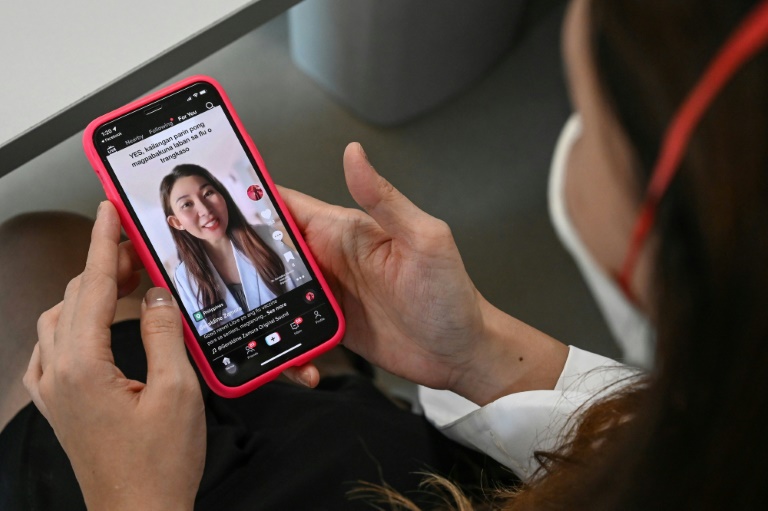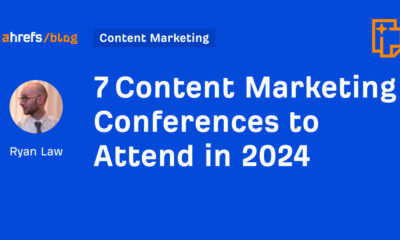SOCIAL
Philippine social media users face barrage of bogus medical posts

Philippine doctors worried about misinformation during the pandemic began posting educational videos online, but the move backfired as promoters of spurious treatments inserted the clips into their own posts – Copyright AFP JAM STA ROSA
Lucille Sodipe and Faith Brown
Philippine vlogger Rosanel Demasudlay holds a heart-shaped “virginity soap” bar in front of the camera and assures her hundreds of YouTube followers it can be safely used to “tighten” their vaginas.
The video is part of a barrage of bogus and harmful medical posts on social media platforms where Filipinos rank among the world’s heaviest users.
Even before Covid-19 confined people to their homes and left them fearful of seeing a doctor, many in the Philippines sought remedies online because they were cheaper and easier to access.
During the pandemic, AFP’s Fact Check team saw an explosion of misinformation about untested cosmetic products and quick-fix treatments for chronic illnesses.
The majority appear as free posts or paid advertisements on Facebook, the most popular social media site among the 76 million internet users in the Philippines.
They can circulate for weeks or even months without detection as Facebook struggles to keep up with the torrent of misinformation flooding its platform.
While there is no vetting of posts before they go live, Facebook has a multi-stage, largely automated, review system to check ads before they are published.
Many of the products are promoted in videos that have been doctored to make it look like real medical professionals are endorsing them.
Others appear in falsified news reports, while some are touted by vloggers such as Demasudlay.
AFP fact checkers have debunked dozens of claims, including a manipulated Philippine news report that appeared to promote a herbal supplement for diabetics as an alternative to insulin.
A single post of the false video was viewed more than three million times, shared more than seven thousand times and attracted almost ten thousand comments from people, many wanting to buy it.
Demasudlay’s 15-minute video was posted in August 2022 and viewed more than ten thousand times.
She falsely claimed the “Bar Bilat Virginity Soap” had been approved by the Philippine Food and Drug Administration as a treatment for skin conditions and a way to tighten the vagina.
“Bilat” means “vagina” in a local Philippine language.
In fact, the FDA has warned consumers against using the “unauthorised” soap due to possible health risks that range from skin irritation to organ failure.
A few months later, Demasudlay admitted in another video that the soap had left her “itchy to the point of bleeding” — but she kept promoting it.
Demasudlay declined to be interviewed by AFP.
– Global problem –
Philippine doctors worried about the explosion of medical misinformation during the pandemic began posting videos providing free information about common health conditions.
But the move backfired as promoters of spurious treatments used clips from those videos and inserted them into their own posts for credibility.
Geraldine Zamora, a rheumatologist in the capital Manila, was among those targeted.
In 2020, she began recording videos and posting them on TikTok, where she has more than 60,000 followers.
“It was a good thing for us because we were able to extend our medical knowledge to people who otherwise wouldn’t be able to consult with doctors,” Zamora said.
Her videos were watched hundreds of thousands of times.
But then the footage was used to promote an unregistered brand of supplement for arthritis, which the FDA had warned consumers about.
The manipulated posts were viewed tens of thousands of times before being taken down by Facebook.
Zamora said some of her patients considered purchasing the product in the belief she was endorsing it.
The World Health Organization told AFP that “inappropriate promotion and advertisements” for unregistered medical products had long been a global problem and the pandemic may have made it worse.
Filipinos were particularly vulnerable to false or misleading health claims due to a shortage of doctors in the country and their heavy internet usage, said Eleanor Castillo, a public health expert at the University of the Philippines.
“Even if we have our rural health units, or village health centres, many of them don’t have doctors or they would visit once a week or twice a month, especially in far-flung areas,” Castillo said.
The consequences of using unapproved treatments can be dire.
Vicente Ocampo, president of the Philippine Academy of Ophthalmology, said patients as young as 12 had become blind after using eye drops bought online instead of consulting a doctor.
“It saddens us that people will readily believe advertisements that claim to heal all eye problems as speedily as possible and pay exorbitant prices for these eye drops,” Ocampo said.
Ocampo said Facebook posts selling an unregistered eye drop brand that had used images of real doctors and the academy’s name.
But the academy struggled to get traction with its warnings about the misinformation.
Its statement issued in September 2022 notifying consumers about the false posts received 57 interactions — likes, shares and comments.
In the same month, four ads for the product reviewed by AFP fact checkers received almost 34,000 interactions.
Some of the viral medical posts AFP has debunked on Facebook were paid advertisements.
The ad policy of Meta, the parent company of Facebook, prohibits any “promises or suggestions of unrealistic outcomes” for “health, weight loss or economic opportunity”.
It says ads for over-the-counter medicines should comply with licences and approvals required by local laws.
However, keyword searches on Meta’s ad library found hundreds of advertisements for products debunked by AFP still on the site.
Meta told AFP it was working with Philippine law enforcement “to address” illegal commercial listings.
SOCIAL
Snapchat Explores New Messaging Retention Feature: A Game-Changer or Risky Move?

In a recent announcement, Snapchat revealed a groundbreaking update that challenges its traditional design ethos. The platform is experimenting with an option that allows users to defy the 24-hour auto-delete rule, a feature synonymous with Snapchat’s ephemeral messaging model.
The proposed change aims to introduce a “Never delete” option in messaging retention settings, aligning Snapchat more closely with conventional messaging apps. While this move may blur Snapchat’s distinctive selling point, Snap appears convinced of its necessity.
According to Snap, the decision stems from user feedback and a commitment to innovation based on user needs. The company aims to provide greater flexibility and control over conversations, catering to the preferences of its community.
Currently undergoing trials in select markets, the new feature empowers users to adjust retention settings on a conversation-by-conversation basis. Flexibility remains paramount, with participants able to modify settings within chats and receive in-chat notifications to ensure transparency.
Snapchat underscores that the default auto-delete feature will persist, reinforcing its design philosophy centered on ephemerality. However, with the app gaining traction as a primary messaging platform, the option offers users a means to preserve longer chat histories.
The update marks a pivotal moment for Snapchat, renowned for its disappearing message premise, especially popular among younger demographics. Retaining this focus has been pivotal to Snapchat’s identity, but the shift suggests a broader strategy aimed at diversifying its user base.
This strategy may appeal particularly to older demographics, potentially extending Snapchat’s relevance as users age. By emulating features of conventional messaging platforms, Snapchat seeks to enhance its appeal and broaden its reach.
Yet, the introduction of message retention poses questions about Snapchat’s uniqueness. While addressing user demands, the risk of diluting Snapchat’s distinctiveness looms large.
As Snapchat ventures into uncharted territory, the outcome of this experiment remains uncertain. Will message retention propel Snapchat to new heights, or will it compromise the platform’s uniqueness?
Only time will tell.
SOCIAL
Catering to specific audience boosts your business, says accountant turned coach

While it is tempting to try to appeal to a broad audience, the founder of alcohol-free coaching service Just the Tonic, Sandra Parker, believes the best thing you can do for your business is focus on your niche. Here’s how she did just that.
When running a business, reaching out to as many clients as possible can be tempting. But it also risks making your marketing “too generic,” warns Sandra Parker, the founder of Just The Tonic Coaching.
“From the very start of my business, I knew exactly who I could help and who I couldn’t,” Parker told My Biggest Lessons.
Parker struggled with alcohol dependence as a young professional. Today, her business targets high-achieving individuals who face challenges similar to those she had early in her career.
“I understand their frustrations, I understand their fears, and I understand their coping mechanisms and the stories they’re telling themselves,” Parker said. “Because of that, I’m able to market very effectively, to speak in a language that they understand, and am able to reach them.”Â
“I believe that it’s really important that you know exactly who your customer or your client is, and you target them, and you resist the temptation to make your marketing too generic to try and reach everyone,” she explained.
“If you speak specifically to your target clients, you will reach them, and I believe that’s the way that you’re going to be more successful.
Watch the video for more of Sandra Parker’s biggest lessons.
SOCIAL
Instagram Tests Live-Stream Games to Enhance Engagement

Instagram’s testing out some new options to help spice up your live-streams in the app, with some live broadcasters now able to select a game that they can play with viewers in-stream.
As you can see in these example screens, posted by Ahmed Ghanem, some creators now have the option to play either “This or That”, a question and answer prompt that you can share with your viewers, or “Trivia”, to generate more engagement within your IG live-streams.
That could be a simple way to spark more conversation and interaction, which could then lead into further engagement opportunities from your live audience.
Meta’s been exploring more ways to make live-streaming a bigger consideration for IG creators, with a view to live-streams potentially catching on with more users.
That includes the gradual expansion of its “Stars” live-stream donation program, giving more creators in more regions a means to accept donations from live-stream viewers, while back in December, Instagram also added some new options to make it easier to go live using third-party tools via desktop PCs.
Live streaming has been a major shift in China, where shopping live-streams, in particular, have led to massive opportunities for streaming platforms. They haven’t caught on in the same way in Western regions, but as TikTok and YouTube look to push live-stream adoption, there is still a chance that they will become a much bigger element in future.
Which is why IG is also trying to stay in touch, and add more ways for its creators to engage via streams. Live-stream games is another element within this, which could make this a better community-building, and potentially sales-driving option.
We’ve asked Instagram for more information on this test, and we’ll update this post if/when we hear back.
-

 PPC5 days ago
PPC5 days ago19 Best SEO Tools in 2024 (For Every Use Case)
-
SEARCHENGINES7 days ago
Daily Search Forum Recap: April 17, 2024
-

 SEO7 days ago
SEO7 days agoAn In-Depth Guide And Best Practices For Mobile SEO
-
SEARCHENGINES6 days ago
Daily Search Forum Recap: April 18, 2024
-

 MARKETING6 days ago
MARKETING6 days agoEcommerce evolution: Blurring the lines between B2B and B2C
-
SEARCHENGINES5 days ago
Daily Search Forum Recap: April 19, 2024
-

 SEO6 days ago
SEO6 days ago2024 WordPress Vulnerability Report Shows Errors Sites Keep Making
-

 WORDPRESS6 days ago
WORDPRESS6 days ago10 Amazing WordPress Design Resouces – WordPress.com News














